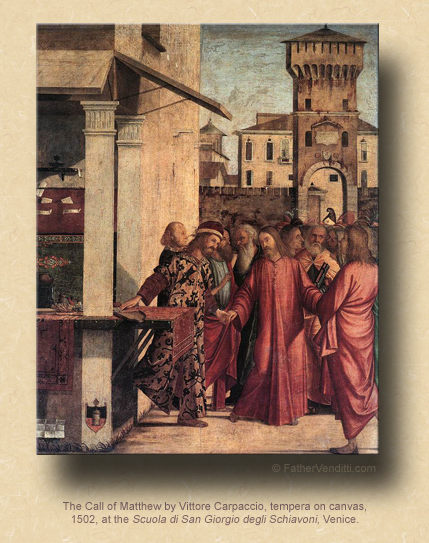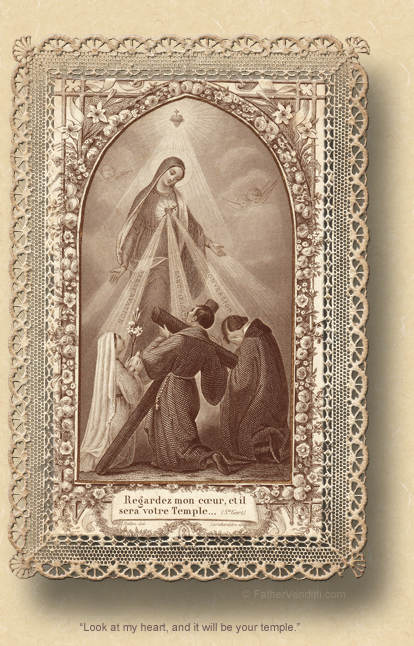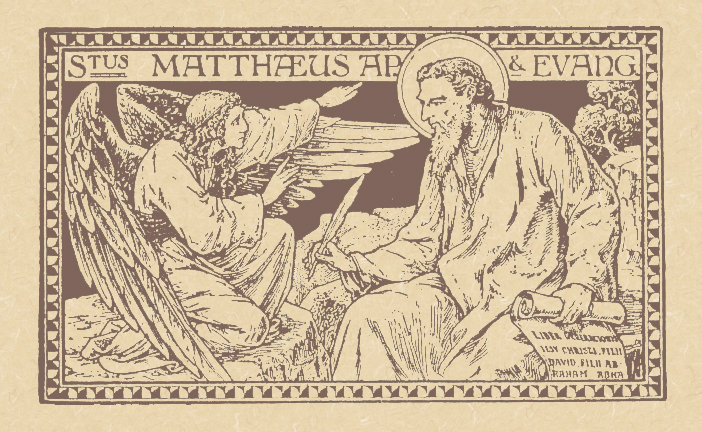Why is the Idea of Following our Lord Immediately so Onerous?
The First Saturday of Lent; and, the Commemoration of Saint Casimir.*
Lessons from the feria, according to the ordinary form of the Roman Rite:
• Isaiah 58: 9-14.
• Psalm 86: 1-6.
• Luke 5: 27-32.
The First Saturday of Lent; the Commemoration of Saint Casimir, Confessor; and, the Commemoration of Saint Lucius I, Pope & Martyr.**
Lessons from the feria, according to the extraordinary form of the Roman Rite:
• Isaiah 58: 9-14.
• Psalm 26: 4.
• Mark 6: 47-56.
The First Saturday of Lent; the Commemoration of the Miracle of Saint Theodore; and, the Feast of Our Venerable Father Gerasimus of the Jordan.***
First & third lessons from the triodion, second & fourth from the menaion for St. Theodore, according to the Ruthenian recension of the Byzantine Rite:
• Hebrews 1: 1-12..
• II Timothy 2: 1-10.
• Mark 2: 23—3: 5.
• John 15: 17—16: 2.
FatherVenditti.com
|
 7:49 AM 3/4/2017 — Today, of course, is First Saturday, and, as is our custom, we will expose our Eucharistic Lord at the end of Mass; and, consistent with the season, we will pray together the Litany of the Sorrowful Mother, with the rest of the Holy Hour yours to converse with our Lord, make use of the confessional, or whatever you want to do with Benediction at 1:30. 7:49 AM 3/4/2017 — Today, of course, is First Saturday, and, as is our custom, we will expose our Eucharistic Lord at the end of Mass; and, consistent with the season, we will pray together the Litany of the Sorrowful Mother, with the rest of the Holy Hour yours to converse with our Lord, make use of the confessional, or whatever you want to do with Benediction at 1:30.
But it is also the First Saturday of Lent which, each year, introduces us to Levi, and how he quickly responded to our Lord's call. We, or course, know him by his pen-name, Matthew, underwhich he wrote the first account of the life of our Lord.† There are a few of these episodes in the Holy Gospel in which our Blessed Lord is gathering around Himself His first disciples: He comes upon people of whom we've not read before, calls them to follow Him, and, without saying a word, they get up and go.
I remember hearing a homily in college on the call of Simon and Andrew wherein the priest tried to tell us that, because the Gospel doesn't tell us everything, we can presume that Simon and Andrew had already known our Lord for some time before He called them, so they weren't simply following Him blindly. I'm not sure why he found the concept of following our Lord blindly offensive, especially as that's what makes the episode meaningful. In fact, I think it's likely that Jesus called a whole slew of people to follow Him in the early days, and the Evangelists tell us about those who actually responded, with an emphasis on those who responded immediately and without question.
If we compare the call of Simon and Andrew to the call of Levi, we notice that, in both instances, these men are busy at their jobs when our Lord approaches them; the one difference is that, in the case of the two brothers, the job at which they work is rather innocuous;—there are no moral or political implications to being a fisherman—but, in the case of Levi, his position as a customs official and tax collector adds a new dimension to his call: he's a hated man. We can relate to this: some Scripture translations call these men “publicans,” that is, public officials; they were hated because, just like they do today, they lived rather high off the hog, profiting from their offices by means of the taxes they collected from their fellow Jews on behalf of the Romans.  In fact, in the minds of many Palestinian Jews, they were traitors, since they were working for the enemy. That's why the Pharisees were so scandalized by our Lord wanting to call Levi. In fact, in the minds of many Palestinian Jews, they were traitors, since they were working for the enemy. That's why the Pharisees were so scandalized by our Lord wanting to call Levi.
Levi, of course, responds very generously to our Lord's call, and shows his gratitude by throwing a party. The reason for his joy at being called by our Lord we may never know, but I tend to think that, like most people who spend their lives scampering after worldly profits, he's found that everything he's accumulated has left him empty inside.
The last thing our Blessed Lord would want is a fancy banquet, but He goes anyway, because He's willing to meet Levi half-way. Levi may have responded to our Lord's call immediately, but his conversion of heart is in no way complete, which is why he thinks that offering our Lord a material reward in return for his call is a good idea. Our Lord accepts it because He's willing to take Levi where he's at. He's not willing to leave Levi where he's at, as we know; but, at least for now He takes him as he is, and this is what the Pharisees and Scribes didn't quite understand. Our Lord's response to them is as familiar as any verse in Sacred Scripture: “Those who are well have no need of a physician, but those who are sick” (Luke 5: 31 RSV). The Vulgate gives the best rendering: Non egent qui sani sunt medico, sed qui male habent—“They that are whole need not the physician: but they that are sick,” the translation coming from the Douay-Rheims.
As we plunge headlong into Lent, and challenge ourselves to reform our lives, we are not only consoled by our Lord's words as they apply to ourselves, but they inspire us to regard those around us with increased charity. Those we meet along the way may not be where they should be—or where we think they should be—on their own journey toward Christ; but, assuming that we're not fooling ourselves regarding our own progress:—which is always a possibility—if our Lord is willing to take them as they are, at least initially, than so should we. After all, one does not inspire conversion in others by berating and lecturing them, but by befriending them and encouraging in them a desire to change. If Jesus had looked at Levi collecting his taxes and said, “I'm not interested in him; he's not what a want,” then the Church would have been deprived of a great Apostle and an entire Gospel.
As the first half-week of Lent draws to a close, let us appeal to our Blessed Lord—and, as it’s First Saturday, also to His Holy Mother—to help us encourage change in others by an increase in the practice of the virtue of charity.

* In the ordinary form during Lent, memorials automatically become commemorations, the observance of which is optional. If observed, only the Collect of the saint is used, with everything else taken from the feria, and the color of the season worn. In the extraordinary form, third class feasts also becoming commemorations, but the observance is not optional, with the commemoration made by an additional Collect, Secret and Postcommunion added to those of the feria, and the color of the season is worn; a Mass for the commemoration is not permitted.
Casimir (1458-1484) was the son of Casimir IV and Elizabeth, King and Queen of Poland and Lithuania. In contrast to other members of the royal court, he was an example faith, piety, humility and chastity. He had great devotion to the Eucharist and the Mother of God, and is the patron of Poland and Lithuania.
** Cf. footnote above.
Pope Lucius I was beheaded for the sake of the Lord in the year 254.
*** The Divine Liturgy is celebrated on the Saturdays and Sundays of the Great Fast.
Theodore was born in Anatolia and was burned to death in Amasia in the fourth century. The First Saturday of Lent always commemorates a miracle attributed to his intercession. His actual feast is on February 17th.
Gerasimus was one of the founders of monasticism in Palestine. In 455 he founded a monastery on the shores of the Jordan River, soon surrounded by many individual hermitages. On the first five days of the week, the hermits lived alone, but gathered on Saturday to celebrate the Divine Mysteries and receive Holy Communion, returning to solitude on Sunday evening. At one time, this monastery counted as many as seventy monks. Gerasimus died on March 5th, 475, and the monastery was destroyed in the tenth century.
† The Gospels of Matthew and Luke contain word-for-word material found in Mark, but also common material between them not found in Mark. What is now known as the “Two Source Theory” posits that whatever is common in Matthew and Luke but not found in Mark must come from some source not yet discovered, to which the proponents of this theory have given the title “Q”; but, the theory depends on the presumption that, because Mark's Gospel is the shortest and the most primitive in style and content, it must therefore be the first written. By the same reasoning, an archeologist a thousand years from now, finding both a copy of Gone with the Wind and a "Reader's Digest" version of the same, would have to assume that the condensed version was the original, and the longer, more embellished one was a later redaction. A more respectful and faith-based explanation for the common material found in the Synoptic Gospels would be the fact that the events and words recorded there were seen and heard by the Evangelists when our Lord did and said them, and the Evangelists recorded them accurately.
Among those trained in the 1970s and early '80s, any challenge to the two source theory is intellectual heresy, and any suggestion that Matthew's Gospel was actually written first is pious pap. They dismiss out-of-hand the testimony of Saint Papias, in the Second Century, that "Matthew put together the oracles [of the Lord] in the Hebrew language, and each one interpreted them as best he could," as well as that of Saint Irenaeus, who dates Matthew's Gospel stating: "Matthew also issued a written Gospel among the Hebrews in their own dialect while Peter and Paul were preaching at Rome and laying the foundations of the church"; Irenaeus, in fact, quotes from it. The pseudo-intellectual sophistry offered by the slaves to source criticism to discredit these statements is nothing more than a symptom of the post-conciliar desacralizing of the Word of God that is still popular in some quarters, not to mention an insult to two great Fathers of the Church, often accompanied by an assertion that it is not intellectually honest to engage in any kind of exegesis with reference to any other source or idea extraneous to the text itself; however, the fact that no original manuscripts of any of the books of the Bible are extent exposes this requirement as nothing more than a convenient way to ensure an already agreed upon conclusion designed to leave open the robbing of Holy Writ of it's dependency on the analogy of faith and the authority of the Church for its proper interpretation.
The bottom line is that the Gospels were written in the order in which they appear in your grandmother's Bible, and the two source theory is nothing more than a relic from the '70s that ought to be buried with Sister Peggy's post-conciliar neon pink pants suit.
|

